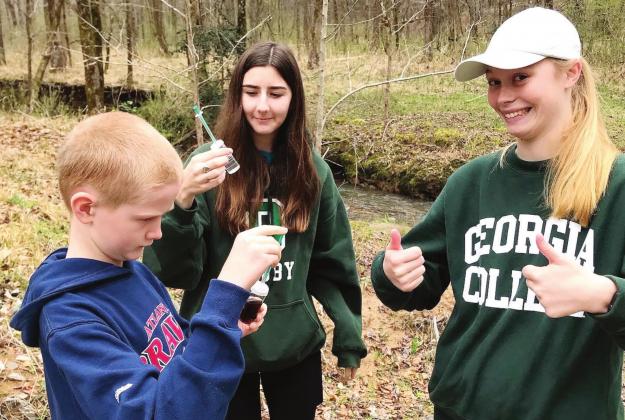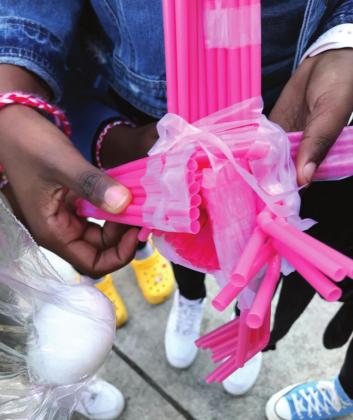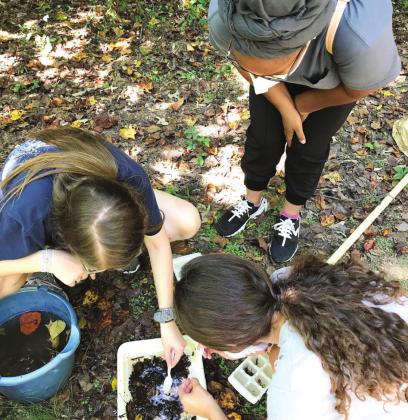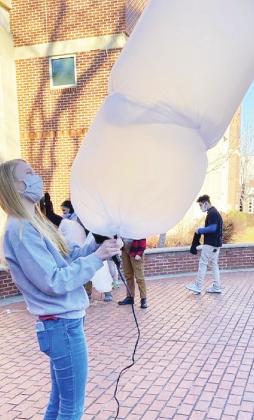The School of Continuing and Professional Studies at Georgia College & State University has a deep focus into education, through the unit of academic outreach (AO), that provides programs to all schools in the community.
Academic Outreach was established in 1968 by Dr. Harriett Whipple as an extension to a class she taught at Georgia College. She wished to include an outreach program to her class that would help her students but also impact the local community.
“I thought experiential learning was very important and I wanted to give my students an opportunity to share their knowledge and share their experiences,” said Dr. Whipple, former executive director of Academic Outreach. “We started it all by just using local connections by doing field trips or going into the school.”
Over the years, the class extension would become its own unit that would eventually open to students all over Georgia College and partner with many schools in the Baldwin County area and beyond.
“It’s a big service for the students and it’s unreal and amazing how much it has grown over the years,” said Dr. Whipple. “It’s very effective now and the impact it has on the community will continue to grow over time.”
Academic Outreach provides programs for Pre-K through twelfth grade students and adults in the Middle Georgia area. All of these programs are facilitated and sometimes created by Georgia College students. Programs may range from in school visitation, after school programs or field trips to Lake Laurel, the main campus or even local museums.
“On a normal year, we usually have about 6000 students that we impact in around 10 counties. Since COVID, our numbers have gone down, but they started coming back up. So we impacted about 4000 students this year, and we’ve broadened our reach around Georgia by doing more partnerships and virtual outreach,” said Ruth Eilers, executive director of Academic Outreach.
AO is funded by an endowment through Kaolin Industries of Georgia for Science Education, so many of the programs focus on science or environmental based lessons. However, these programs are customizable and can be requested for other subjects.
“So it’s not like you can choose activities in A, B or C programs,” said Eilers. “We talk to the group that we’re working with and see what they want to cover to plan programs. From there, we use the Georgia performance standards to create a lesson and use teacher input to plan a program that meets the custom needs of that group.”
The base of the program is run by Georgia College students who are part of the Community Action Team for Service (CATS). CATS members act as teachers, assistants, lesson planners and help run the AO social media. This allows college students, of a variety of majors, to get hands-on experience teaching, volunteering and working with all different ages and types of people.
“In a year, we normally have around 50 to 60 students who are involved in our program,” said Eilers. “The college students have a major impact on the kids. It’s special to the students to see that somebody somewhat close to their age shows interest in them and is excited about learning. I think that impact is probably the most important impact that we make on students.”
Some of the most popular programs that AO has offered include summer camps and hands-on science experiments. Every summer, excluding the summers of COVID, AO has hosted a science camp in partnership with the Science Education Center. Every year, the students of the previous year’s camp pick next year’s science topic. Part of the impact in lessons and camps is to include student input. Outside of camp, some popular programs have included lessons on genetics, the body, creatures and the inflatable planetarium. “Every year we do a
“Every year we do a science camp and a creature camp that are widely popular,” said Eilers. “For other programs we cover a diverse range of topics from microscopes to genetics programs talking about how dragons breed. We include fun ideas into the lesson so teaching them is interactive and to their interests.”
While most programs cater to Pre-K through twelfth grade, AO does offer an adult program. Adopt a Stream is a program that’s geared towards adults. Monthly, AO takes a group out to do chemical monitoring of a creek or stream. They also do a variety of river cleanups and partner with different groups, such as the greenway. As of now, the program is made up of majority college students and faculty but is open to the wider community.
“As you can see, we have a variety of programs but we definitely had to adapt like many did when COVID hit. It’s hard to do hands-on programs when you can’t be near one another,” said Eilers.
COVID had a big impact on Academic Outreach due to schools closing down. During COVID, AO chose to host virtual lessons, create a YouTube channel and Georgia College students began a scientific tag called #bobcatbyte. Bobcatbyte allowed the CATS members to teach safely from home and put their own interests into their scientific facts.
“Bobcatbyte is a collection of little snippets of something cool in your everyday life and the science behind it. We plan to continue it towards the future,” said Eiler. “The students have covered things from how to clean your hands to the science behind fingernail polish to the physics behind Frisbee Golf.”
Academic Outreach is hosting Science Camp: Electricity and Explosions this June for two different weeks, one each for elementary and middle school. Creature camp will be taking place in July of this summer as well. To learn more about Academic Outreach, visit their Facebook or check out some of their older virtual lessons at GC Academic Outreach on Youtube.
“I am just so passionate about our outreach and about sharing my knowledge and my students’ knowledge to everyone,” said Eilers. “I hope everyone can take this opportunity to learn more about us and how we work with the community.”




